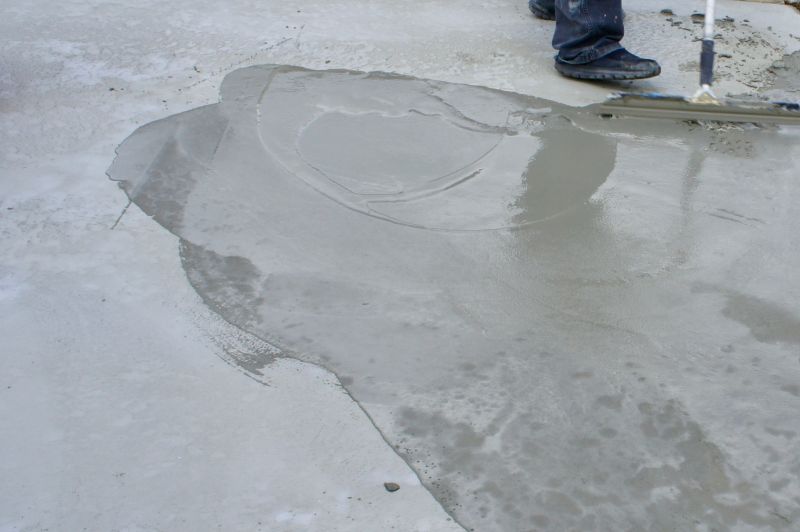Leading Products For Concrete Coating Service Professionals
Discover top-rated tools and materials essential for delivering high-quality concrete coating solutions efficiently.
 Concrete coating services encompass a wide array of products designed to enhance, protect, and beautify concrete surfaces. These products include various types of sealers, epoxy coatings, stains, overlays, and primers that cater to different project needs. Whether restoring a worn driveway, upgrading a garage floor, or creating decorative outdoor spaces, selecting the appropriate coating products is essential for achieving durable and visually appealing results.
Concrete coating services encompass a wide array of products designed to enhance, protect, and beautify concrete surfaces. These products include various types of sealers, epoxy coatings, stains, overlays, and primers that cater to different project needs. Whether restoring a worn driveway, upgrading a garage floor, or creating decorative outdoor spaces, selecting the appropriate coating products is essential for achieving durable and visually appealing results.
Top Overall Option
Multi-Purpose Concrete Coating System
A versatile concrete coating system that combines primer, base coat, and topcoat layers designed for various applications. It offers ease of application, good adhesion, and a range of finish options suitable for both indoor and outdoor surfaces. This type of product provides a comprehensive solution for those seeking a reliable, all-in-one coating approach.
Types of Products For Concrete Coating Service
Epoxy Coatings
Durable and chemical-resistant coatings ideal for garage floors, commercial spaces, and industrial settings.
Polyurethane Coatings
High-gloss, flexible coatings that provide excellent UV resistance and long-lasting finish.
Acrylic Sealers
Water-based sealers offering a clear, protective layer that enhances color and surface durability.
Penetrating Sealers
Invisible sealers that absorb into concrete to reduce porosity and prevent moisture intrusion.
Concrete Stains
Coloring agents that penetrate the surface to create decorative effects with transparent or opaque finishes.
Overlay Materials
Thin layers of concrete or polymer-modified overlays used to repair and decorate existing surfaces.
Polyaspartic Coatings
Fast-curing coatings suitable for large projects requiring quick turnaround times.
Self-Leveling Toppings
Products designed to create smooth, level surfaces over uneven concrete.
Bonding Agents
Primers that enhance adhesion between old concrete and new coating layers.
Textured Coatings
Products that add slip-resistant textures for safety and aesthetic purposes.
Garage Floor Paints
Specialized paints formulated for durability in garage environments with high traffic.
Decorative Concrete Resurfacing
Products designed to refresh and decorate old or damaged concrete surfaces.
Chemical Resistant Coatings
Coatings formulated to withstand exposure to harsh chemicals and spills.
Moisture Sealers
Products that prevent water infiltration and reduce surface efflorescence.
Popular Choices
Widely used for their durability and glossy finish, suitable for various indoor applications.
Popular for enhancing the natural look of concrete while providing protection.
Trending for creating unique, colorful patterns and effects on concrete surfaces.
Chosen for their high-gloss finish and resistance to UV damage in outdoor settings.
Popular for repairing uneven floors and creating smooth surfaces rapidly.
Commonly selected for their ease of application and durability in high-traffic garage spaces.
In demand for safety features, especially in outdoor walkways and pool decks.
Preferred in industrial and commercial environments for their protective qualities.
Essential for ensuring adhesion between old and new concrete layers, widely used in resurfacing projects.
Popular for their ease of use and ability to enhance surface appearance with a clear finish.
Growing in popularity for fast curing times and high durability in large-scale projects.
Chosen for decorative enhancements and surface repairs in residential and commercial spaces.
The selection process often involves considering the specific surface conditions, the desired appearance, and the level of protection needed. Some coatings are formulated for high-traffic areas, offering resistance to abrasion and chemicals, while others focus on aesthetic enhancements through color and texture. Proper preparation and application are critical to ensure that the coating adheres well and performs as intended.
In addition to functional performance, ease of use and application methods can influence product choice. Many coatings are available in ready-to-use formulations or require mixing and specific tools for application. Understanding the differences between solvent-based and water-based products can help in making an informed decision, as each has its own advantages and considerations.
When planning a concrete coating project, it is also important to consider the long-term maintenance requirements. Some coatings may need periodic reapplication or touch-ups to maintain their appearance and protective qualities. Consulting product labels and manufacturer guidelines can provide valuable insights into the lifespan and care routines associated with each product type.
Key Buying Considerations
- Surface compatibility: Ensure the product is suitable for the specific concrete surface and condition.
- Intended use: Consider whether the coating is for decorative, protective, or functional purposes.
- Durability requirements: Evaluate the expected wear, chemical exposure, and environmental conditions.
- Application method: Determine if the product is suitable for brush, roller, spray, or trowel application.
- Curing time: Check how long the coating takes to dry and cure before use or exposure.
- Finish type: Decide between matte, satin, gloss, or textured finishes based on aesthetic preferences.
- Ease of application: Consider products that match your skill level and available tools.
- Long-term maintenance: Understand if the coating requires reapplication or special cleaning routines.
- Compatibility with existing coatings: Verify if the product can be applied over current surfaces without extensive prep.
- VOC content and fumes: For indoor projects, consider low-VOC options to reduce odors and health risks.
- Cost and coverage: Compare the cost per square foot and coverage rates to fit your budget.
- Color options: Look for products offering a range of colors or transparent finishes to meet design goals.
- Weather resistance: For outdoor surfaces, select coatings that withstand UV exposure, moisture, and temperature fluctuations.
- Environmental conditions: Ensure proper temperature and humidity levels during application for optimal results.
- Brand reputation and reviews: Consider products with positive feedback and proven performance from trusted sources.
This content may contain affiliate links. We may earn a commission if you purchase through these links, at no additional cost to you.
